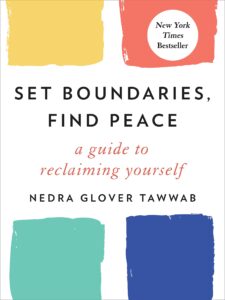Set Boundaries, Find Peace: The Book We Need RIGHT NOW
As I type these words, Florida’s House of Representatives is forwarding a “Don’t Say Gay” bill to their Senate that would prohibit discussions of sexual and gender identity in schools. The governor of Texas has deemed gender-affirming care to be child abuse. And Russia is invading Ukraine. To say it’s been a devastating week is an understatement.
And yet, I’m coping fairly decently, thanks to a recent read by Nedra Glover Tawwab: Set Boundaries, Find Peace: A Guide to Reclaiming Yourself.
 I put Tawwab’s book at the top of my TBR list to support my new year’s goal of prioritizing wellbeing and being better at boundaries. My friend Kimberly RAVED about the book and used it in one of her graduate seminar modules last semester. I wish I had dropped everything to read along with them because the book is profoundly useful, and I know it would’ve helped me manage my overwhelming fall burnout.
I put Tawwab’s book at the top of my TBR list to support my new year’s goal of prioritizing wellbeing and being better at boundaries. My friend Kimberly RAVED about the book and used it in one of her graduate seminar modules last semester. I wish I had dropped everything to read along with them because the book is profoundly useful, and I know it would’ve helped me manage my overwhelming fall burnout.
A licensed therapist and relationship expert, Tawwab offers important advice for negotiating boundaries in relationships—with romantic partners, family, friends, work, and ourselves.
I’m especially grateful today for her advice about boundaries with social media and the internet because past Shawna would’ve probably spent the day doomscrolling news and feeling her anxiety about world events spin out of control. Present Shawna has still scrolled and is feeling devastated—but enacting a boundary around media has helped tremendously.
What I appreciated most about the book was how Tawwab demonstrated the ways that our childhood traumas and challenges influence our adult boundary setting. I can now see more clearly why I have porous (POOR) boundaries around work and routinely suffer stress and burnout due to coping skills I learned as a young person. But unlike other books, Tawwab offers a message of hope as well as practical advice about how to establish boundaries (or reestablish them as the case may be). I especially valued her many examples, including sample phrasing for setting and maintaining boundaries in difficult situations.
And most of all, I appreciated that Tawwab was clear and honest about how difficult maintaining boundaries can be. That it really isn’t possible to establish boundaries, especially with family and work, without guilt. And that that’s okay. And that having and communicating boundaries is vital to our mental and emotional wellbeing, so the challenge is worth it.
I wish I’d had this book a decade ago. Stop whatever you’re doing and order a copy.